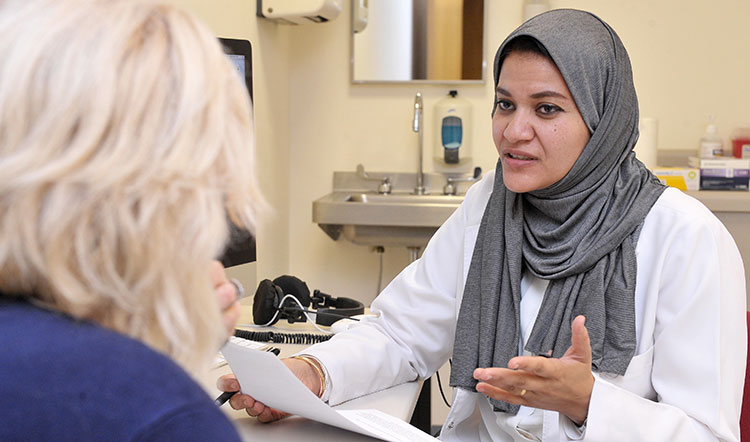WCM-Q program boosts physician training and assessment skills
 Dr. Shireen Suliman of Hamad Medical Corporation completed the OSCE training program at Weill Cornell Medicine-Qatar (WCM-Q).
Dr. Shireen Suliman of Hamad Medical Corporation completed the OSCE training program at Weill Cornell Medicine-Qatar (WCM-Q).
A training program run by Weill Cornell Medicine-Qatar has equipped medical professionals with the knowledge to develop sophisticated practical examinations to comprehensively assess the skills of trainee physicians.
The course showed physician-educators from WCM-Q and Hamad Medical Corporation how to design and conduct an Objective Structured Clinical Examination (OSCE)—one of the key teaching and assessment tools used in the training of doctors.
The OSCE utilizes ‘standardized patients’—trained actors who play the role of patients—to create a lifelike simulated learning environment in which the clinician is tasked with conducting a thorough medical examination. This teaches and allows for the assessment of core practical skills such as how to take a medical history, check vital signs, perform various physical examinations to determine the health of the patient, and communicate effectively with a patient, among other competencies.

The course, entitled ‘Certificate Program in the Development of an Objective Structured Clinical Examination’, was delivered by WCM-Q’s Division of Continuing Professional Development and other WCM-Q faculty and staff in the college’s state-of-the-art Clinical Skills Center. In five sessions over six weeks, the course provided fifteen participants with the skills to design and deliver a comprehensive OSCE program to maximize learning outcomes and ensure effective assessment, such as how to set clear program objectives, write cases, devise appropriate checklists and scoring systems, give effective feedback to learners after assessment and train standardized patients.
WCM-Q’s Dr. Dora Stadler, Clinical Assistant Professor of Medicine, and Deema Al-Sheikhly, Director of Continuing Professional Development, directed the course.
Ms. Al-Sheikhly said: "By replicating real-life consultations between doctors and patients we are able to create very powerful learning and assessment experiences for trainees, and we can vary the circumstances of each case almost endlessly. This allows the trainee to develop a diverse ‘toolbox’ of skills so they can operate effectively in a variety of situations and with different patients, and our facilities at WCM-Q allow trainers to give very precise feedback. We are very pleased that the participants have shown so much commitment and enthusiasm to learn how to design and implement an effective OSCE program."
The final learning session made use of the Clinical Skills Center’s hi-tech examination rooms, which are equipped with audiovisual monitoring systems that allow faculty to discreetly assess learners as they perform simulated consultations with standardized patients. This was the second year the course has been offered, and it will continue to run on an annual basis. Two physicians who completed the course last year as participants—Dr. Liam Fernyhough, Assistant Professor of Medicine at WCM-Q, and Dr. Hassan Mobayad, Allergy and Pulmonary Consultant at Hamad Medical Corporation—served as instructors this year. WCM-Q’s Dr. Stella Major, Associate Professor of Family Medicine in Clinical Medicine, and Lan Sawan, Manager of the Clinical Skills Center, also facilitated the delivery of the program.
Course participant Dr. Shireen Suliman, Associate Consultant in Internal Medicine at Hamad Medical Corporation, said: "The program helped me understand how to develop cases and how to work with a standardized patient to create lifelike learning and assessment experiences for participants. I’m very pleased because this type of immersive experience is extremely effective as a training and assessment tool."